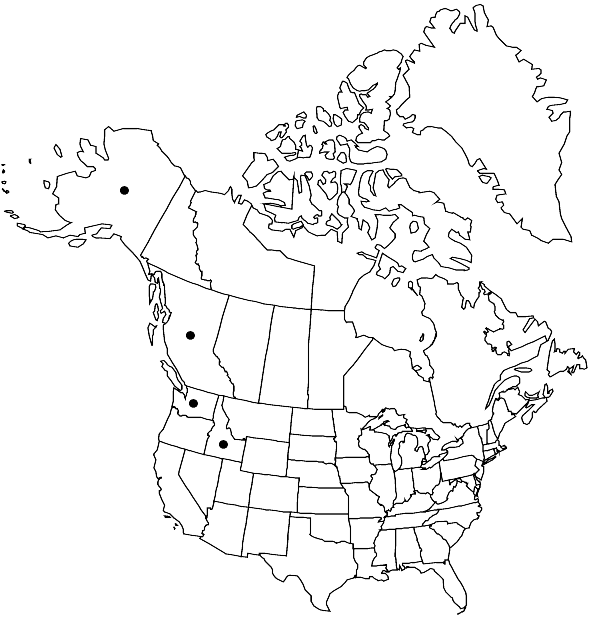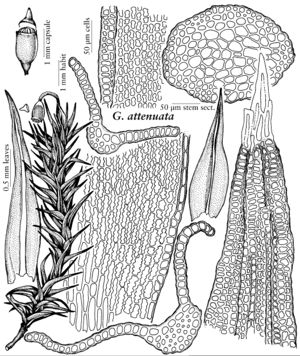Difference between revisions of "Grimmia attenuata"
Eur. N. Amer. Bryin. 2: 228. 1898,.
FNA>Volume Importer |
FNA>Volume Importer |
||
| Line 25: | Line 25: | ||
|distribution=B.C.;Alaska;Idaho;Wash. | |distribution=B.C.;Alaska;Idaho;Wash. | ||
|discussion=<p>Of conservation concern.</p><!-- | |discussion=<p>Of conservation concern.</p><!-- | ||
| − | --><p>Grimmia attenuata resembles forms of the extremely variable Racomitrium heterostichum (= Bucklandiella heterosticha), and because G. N. Jones (1933) mentioned five varieties of the latter, it is not surprising that in some herbaria, e.g. NY, all specimens of G. attenuata have been filed as varieties of R. heterostichum. In 1898, Kindberg realized that his species is not a Racomitrium, but a Grimmia, and wrote: “Habit of G. elatior.” In spite of Kindberg’s correct transfer to Grimmia, T. C. Frye (1917–1918) synonymized G. attenuata with R. macounii. Adding to the confusion, H. A. Möller (1929) synonymized it with G. elatior, and J. Muñoz (1999b) cited it as G. arcuatifolia, which is a synonym of G. lisae. Grimmia elatior is characterized by ellipsoid striate capsules, leaf margin broadly recurved on just one side, and an opaque 2-stratose distal lamina with rounded usually mammillose to papillose cells, the mid leaf cells quadrate to short-rectangular with slightly sinuose, thick walls. Like Grimmia leibergii, G. attenuata is characterized by its elongate to linear, strongly nodulose and thick-walled basal juxtacostal cells, its extremely thick-walled and sinuouse medial cells, leaf margins both recurved, and stem central strand absent. However, the two differ in costa shape and basal marginal cell shape.</p> | + | --><p><i>Grimmia attenuata</i> resembles forms of the extremely variable <i>Racomitrium</i> heterostichum (= <i>Bucklandiella heterosticha</i>), and because G. N. Jones (1933) mentioned five varieties of the latter, it is not surprising that in some herbaria, e.g. NY, all specimens of <i>G. attenuata</i> have been filed as varieties of R. heterostichum. In 1898, Kindberg realized that his species is not a <i>Racomitrium</i>, but a <i>Grimmia</i>, and wrote: “Habit of <i>G. elatior</i>.” In spite of Kindberg’s correct transfer to <i>Grimmia</i>, T. C. Frye (1917–1918) synonymized <i>G. attenuata</i> with <i>R. macounii</i>. Adding to the confusion, H. A. Möller (1929) synonymized it with <i>G. elatior</i>, and J. Muñoz (1999b) cited it as G. arcuatifolia, which is a synonym of <i>G. lisae</i>. <i>Grimmia elatior</i> is characterized by ellipsoid striate capsules, leaf margin broadly recurved on just one side, and an opaque 2-stratose distal lamina with rounded usually mammillose to papillose cells, the mid leaf cells quadrate to short-rectangular with slightly sinuose, thick walls. Like <i>Grimmia leibergii</i>, <i>G. attenuata</i> is characterized by its elongate to linear, strongly nodulose and thick-walled basal juxtacostal cells, its extremely thick-walled and sinuouse medial cells, leaf margins both recurved, and stem central strand absent. However, the two differ in costa shape and basal marginal cell shape.</p> |
|tables= | |tables= | ||
|references= | |references= | ||
| Line 48: | Line 48: | ||
|publication year= | |publication year= | ||
|special status= | |special status= | ||
| − | |source xml=https://jpend@bitbucket.org/aafc-mbb/fna-data-curation.git/src/ | + | |source xml=https://jpend@bitbucket.org/aafc-mbb/fna-data-curation.git/src/8f726806613d60c220dc4493de13607dd3150896/coarse_grained_fna_xml/V27/V27_342.xml |
|subfamily=Grimmiaceae subfam. Grimmioideae | |subfamily=Grimmiaceae subfam. Grimmioideae | ||
|genus=Grimmia | |genus=Grimmia | ||
Revision as of 16:54, 18 September 2019
Plants robust, brownish to reddish in distal part, black and frequently defoliated proximally. Stems 5–10 cm, central strand absent. Leaves straight appressed when dry, erectopatent when moist, lanceolate, 2.7–3.5 × 0.5–0.75 mm, sharply keeled distally, margins narrowly reflexed on both sides, awns terete, firm and short, denticulate, costa 70-120 µm wide at base, channeled distally, circular, projecting on dorsal side; basal juxtacostal laminal cells elongate with extremely thick, slightly nodulose walls; basal marginal laminal cells in a few rows short-rectangular, thin-walled; medial laminal cells short- to long- rectangular with extremely thick and sinuose lateral walls; distal laminal cells 1-stratose, apex and margins 2-stratose. Gemmae absent. Sexual condition dioicous. Seta cygneous, 3–4 mm. Capsule sporadically present, exserted, yellowish brown, ovoid, smooth, exothecial cells thin-walled with incrassate corners, annulus present, operculum rostrate, peristome teeth orange, 40–60 µm wide at base, split and perforated, smooth proximally, papillose distally. Calyptra not seen.
Habitat: Loose tufts on dry boulders
Elevation: low to moderate elevations (0-1000 m)
Distribution

B.C., Alaska, Idaho, Wash.
Discussion
Of conservation concern.
Grimmia attenuata resembles forms of the extremely variable Racomitrium heterostichum (= Bucklandiella heterosticha), and because G. N. Jones (1933) mentioned five varieties of the latter, it is not surprising that in some herbaria, e.g. NY, all specimens of G. attenuata have been filed as varieties of R. heterostichum. In 1898, Kindberg realized that his species is not a Racomitrium, but a Grimmia, and wrote: “Habit of G. elatior.” In spite of Kindberg’s correct transfer to Grimmia, T. C. Frye (1917–1918) synonymized G. attenuata with R. macounii. Adding to the confusion, H. A. Möller (1929) synonymized it with G. elatior, and J. Muñoz (1999b) cited it as G. arcuatifolia, which is a synonym of G. lisae. Grimmia elatior is characterized by ellipsoid striate capsules, leaf margin broadly recurved on just one side, and an opaque 2-stratose distal lamina with rounded usually mammillose to papillose cells, the mid leaf cells quadrate to short-rectangular with slightly sinuose, thick walls. Like Grimmia leibergii, G. attenuata is characterized by its elongate to linear, strongly nodulose and thick-walled basal juxtacostal cells, its extremely thick-walled and sinuouse medial cells, leaf margins both recurved, and stem central strand absent. However, the two differ in costa shape and basal marginal cell shape.
Selected References
None.
